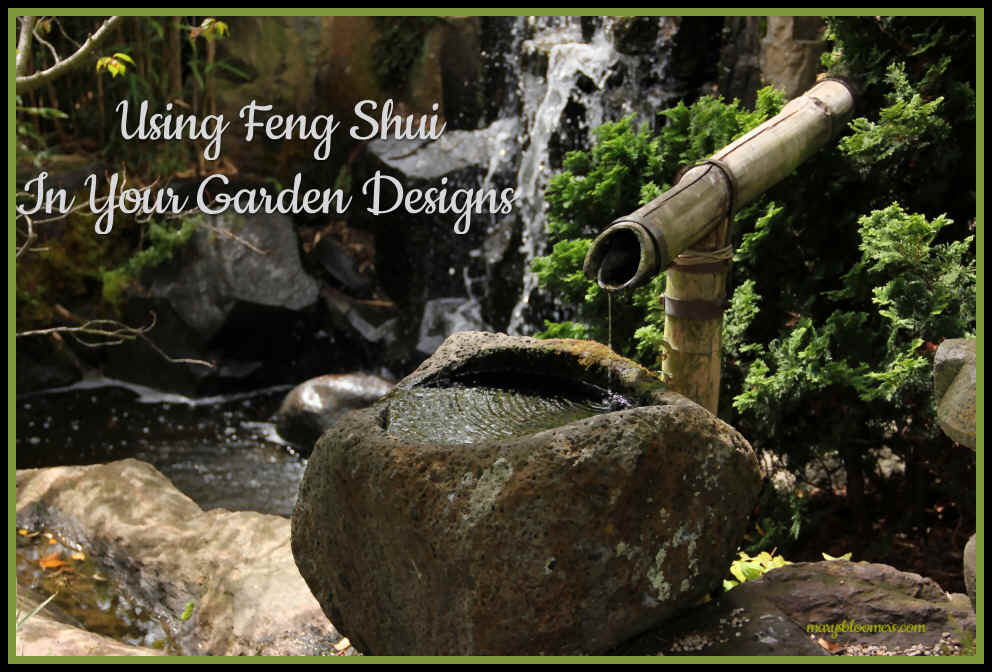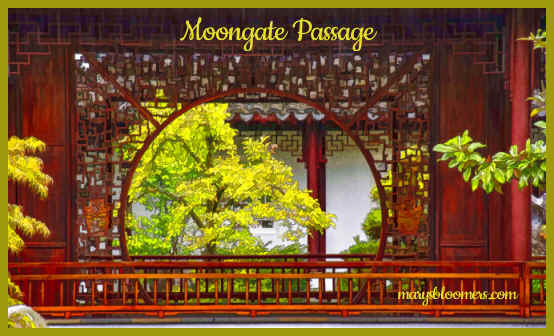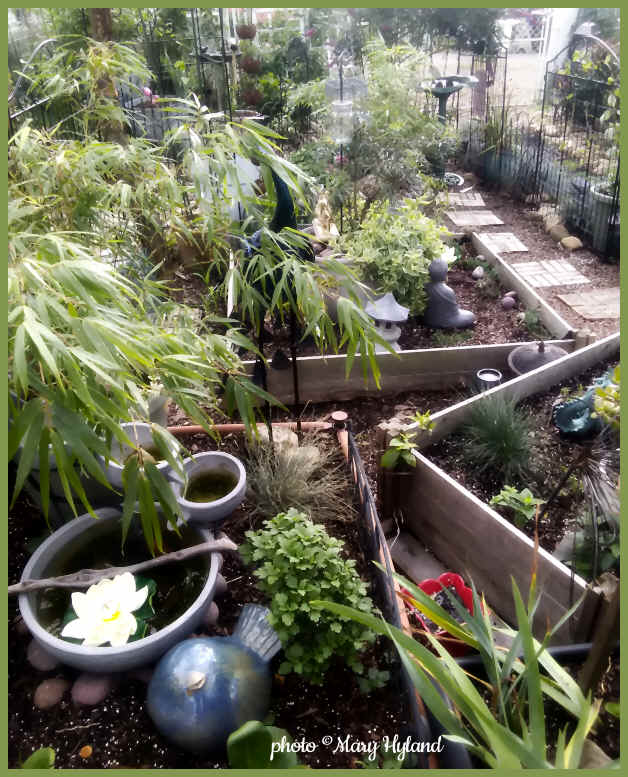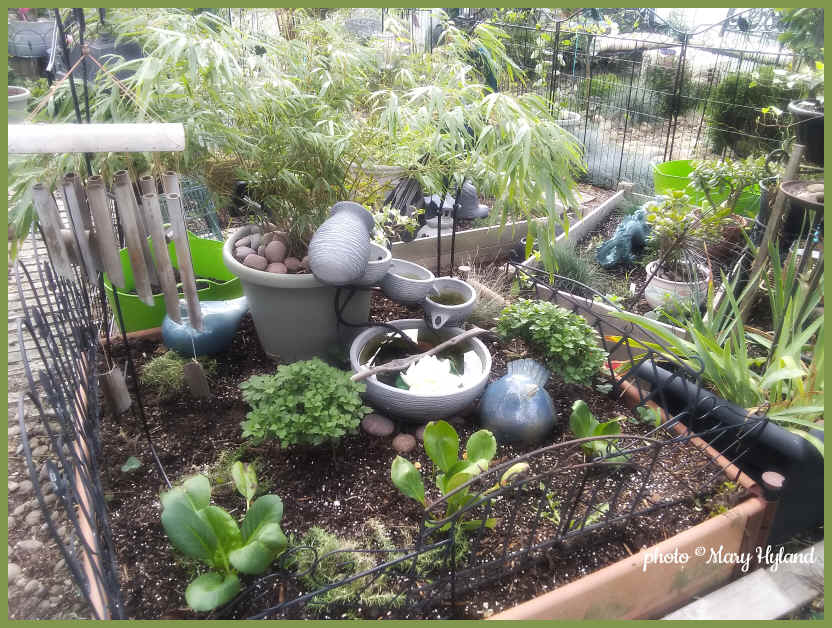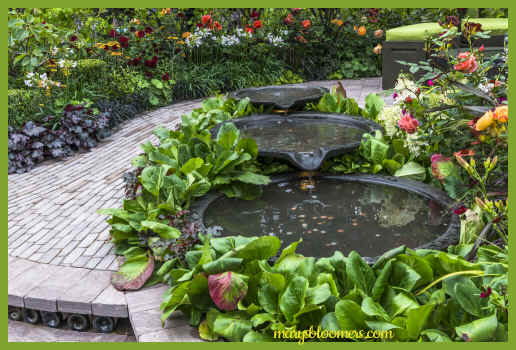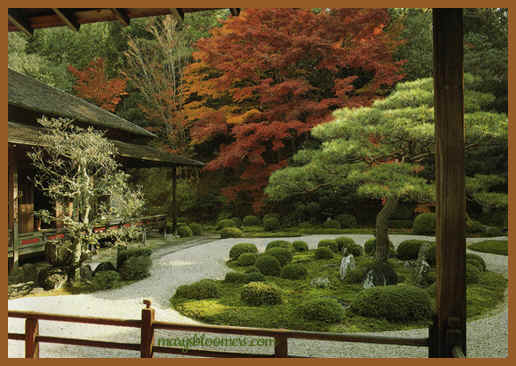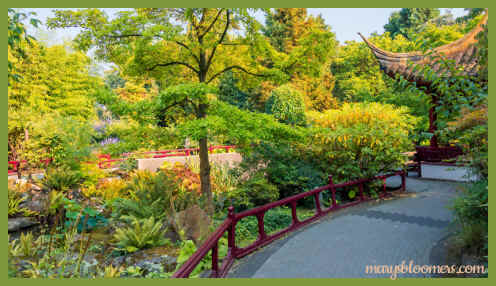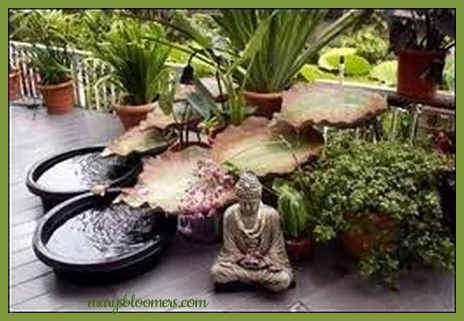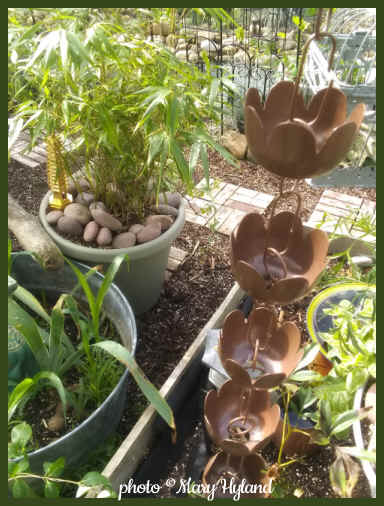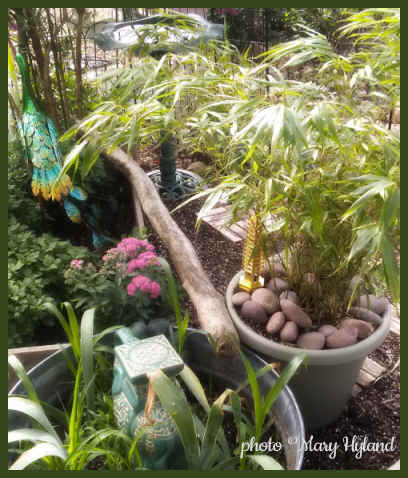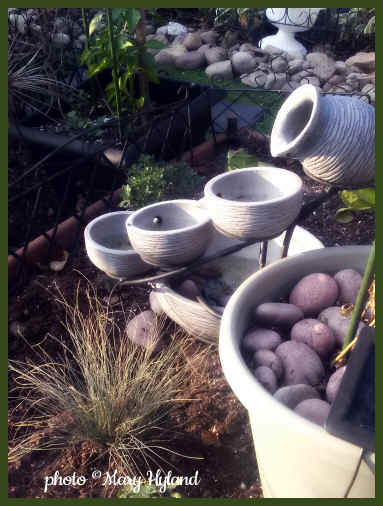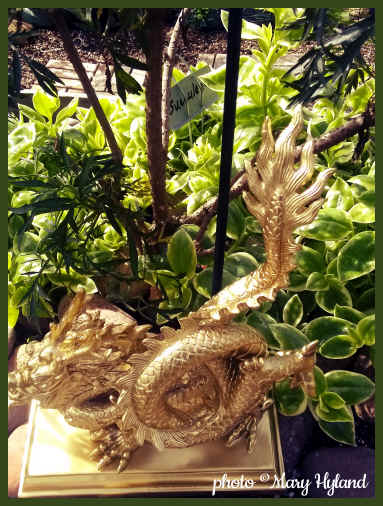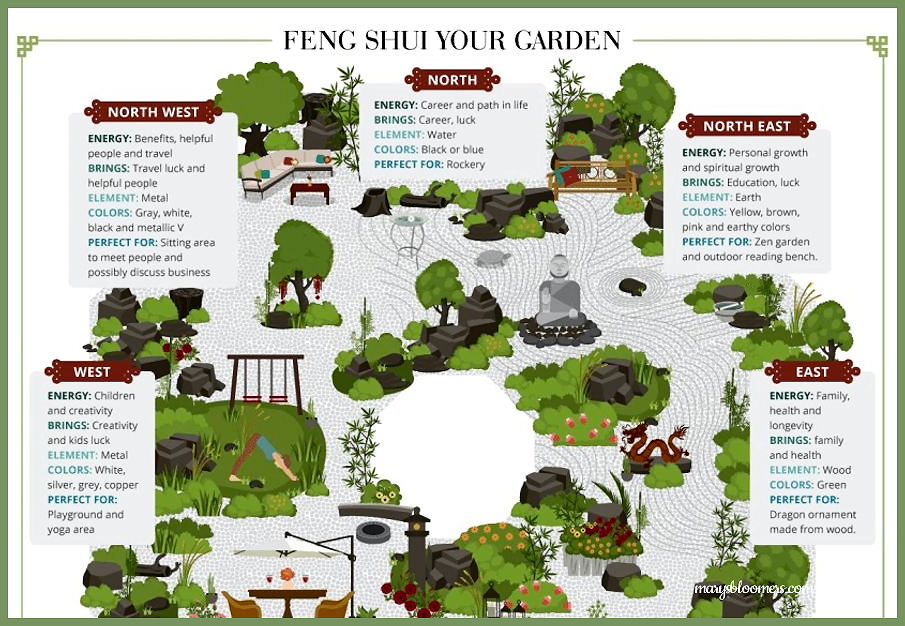|
|
||||||||||||
|
As defined in the Oxford Dictionary, feng shui (geomancy) is a system of laws considered to govern spatial arrangement and orientation in relation to the flow of energy (chi), and whose favourable or unfavourable effects are taken into account when siting and designing buildings. Wikipedia defines feng shui as a Chinese philosophical system of harmonizing everyone with the surrounding environment. The term feng shui literally translates as ‘wind-water’ in English. Pronounced "fung shway" Applying this concept to the design of our gardens can optimize the space to help make them calming and relaxing places that can aid our well-being and spiritual calm. My zen gardens' designs are a combination of Asian Gardens and Zen Philosophy. Zen is my overall theme, and it's all about me, in my present state of being. Serenity and Mindfulness. Feng Shui is the design of a space that is meant to affect my future, or heal (fix) my present, avoid future mishaps, bring me good luck. My zen gardens can apply feng shui concepts, with the focus on my serenity. I begin with any Asian garden design, and then add zen and feng shui principles. A feng shui garden sounds complicated, but if you browse the photos, you can see that it is a very clean and simple style to achieve, using natural materials and soothing shapes. It's actually much simpler than a lot of the garden themes I've posted. **As with all of my design ideas and the practical use of them in my own gardens, I suggest you use your favorite things, in your favorite spaces, and whatever makes you happy, within the design theme. Don't consider the advice for traditional designs to be law of your land. Budget, space, time and your own creativity should be your guide. I'm just the messenger for facts and tradition. Creativity is a big part of serenity. Unleash it with your own version of a garden design theme, using the traditional ideas. I don't have unlimited resources, or a team of garden workers, designers, and photographers to create that magazine-picture-perfect look. I use the traditional design ideas, but i drop my fantasies, to create my reality. Photos of design ideas and styles are very pretty, and perfect for creating a roadmap to the look and concept you want to achieve. Applying the principles of feng shui to the garden landscape design will give a feeling of calm and well-being. Design your garden using the ancient art of feng shui for a tranquil place in nature that is inviting, relaxing, and energizing. The use of the feng shui elements, the arrangement of color, and the placement of each object or plant, have an important role in the balance and harmony you want to create. Curvy areas and pathways, raised flowerbeds, and various levels of rock, all help the chi energy to flow through your garden. Feng shui works with the beauty of nature and enhances all of the Earth's elements such as wood, water, metal, fire, and earth. The goal of a feng shui garden is to achieve balance in these elements with your overall landscape design. You can design your garden in a style reminiscent of Ancient Chinese Gardens, or a traditional Japanese Garden, applying feng shui principles as you go along. Feng shui works with, not against, nature, and takes into consideration many different elements. Chinese architecture from early times used concepts from Chinese cosmology ... feng shui (geomancy) and Taoism to organize construction and layout from common residences to imperial and religious structures. Feng shui gardens feature the three feng shui key of mountains, greenery, and water featured. Rocks and raised flowerbeds can symbolically represent mountains, while plants, shrubbery, or trees provide the necessary greenery. A water feature can provide the water element such as a fountain, pond, or birdbath. You may prefer to create a symbolic river of stones and rocks to represent water. The art of combining and positioning objects in a garden, including the furniture and decorative items, plants, water features, and rocks, is based on a belief in yin and yang patterns and the Chi's (your energy's) flow, in order to produce positive effects. The Meaning of the Plants Depending upon energy content and effect,
plants are assigned to the ” five Feng Shui items “: For the Chinese, plants are the source of feelings and hopes; therefore everyone feels drawn to different plants in different ways. “Only which pleases, can itself positively affect.” Also be sure to consider the respective growing requirements for location of the plants. Popular Perennial Feng Shui Plants My gardens contain most
of the plants suggested that would grow
Include the Five Elements of feng Shui in Garden Design The five elements of feng shui are represented in your garden by various plants and objects. The following are some of the ways to bring the elements into your garden.
Depending upon energy content and
effect, plants are assigned to the five Feng Shui items... Small modifications, like a water fountain or windchimes in the correct place, can bring Feng Shui into your garden. The most important thing is how the changes you make or elements you add will make you feel. I fill my landscapes with decorative copper rain chains, lots of deep tone windchimes, and lucky dragons. I have several birdbath fountains and small water features that add to my serenity and relationship with nature. Choose Zen Colors Colors play an important role in a
feng shui garden. They should bring you pleasure when you look at them as
they reflect back to you positive healing energy. Different colors have
different energy levels and affect our feelings and moods. For example,
cool colors such as purples and white have a soothing effect while hot
colors like reds and bright yellows make your energy level rise. Both
types of colors are wonderful in a feng shui garden but they should never
be mixed together or in the same area. In feng shui the yin colors are
healing and relaxing.
The yang colors represent the elements of wood and fire. They provide motivation, enthusiasm and positive energy to achieve your goals.
Avoid Garden Clutter Feng shui gardens must be free of
clutter so the chi (your energy) has an unobstructed path throughout. A garden should
have order, with everything having a specific purpose and place. Each
tree, plant and object is there to balance the five feng shui elements.
Remove fallen tree branches, dried leaves or decaying plants right away as
their presence disrupts the flow of chi and lowers the energy level of the
area. Redesign straight walks and edges into gentle curves - Or place a plant, urn, sculpture, loose-leafed plant or other impediment to break up their straight-ahead look and feel. Tone down or round off corners, and place small plants, stones or other objects along long edges. Break up solid fences or hedges with an irregular plant or object. Add a few warm light solar fairy lights, light-colored plants, or a gazing globe or mirror to dimly-lit areas. Make wildlife comfortable in your garden Especially
birds, butterflies, bees and dragonflies (these will come only if you have
a water feature). Dragonflies can devour vast amounts of mosquitos per
day. And that will keep your habitat and serenity garden special places
for you and your guests to relax.
Add Doorways and
Passageways
throughout your garden design and, if space allows, along the pathways as you move from one area
to another.
Sources: Quick Links
Content, graphics,
photos and design ©2020 marysbloomers.com
This
site uses Watermarkly Software
|
